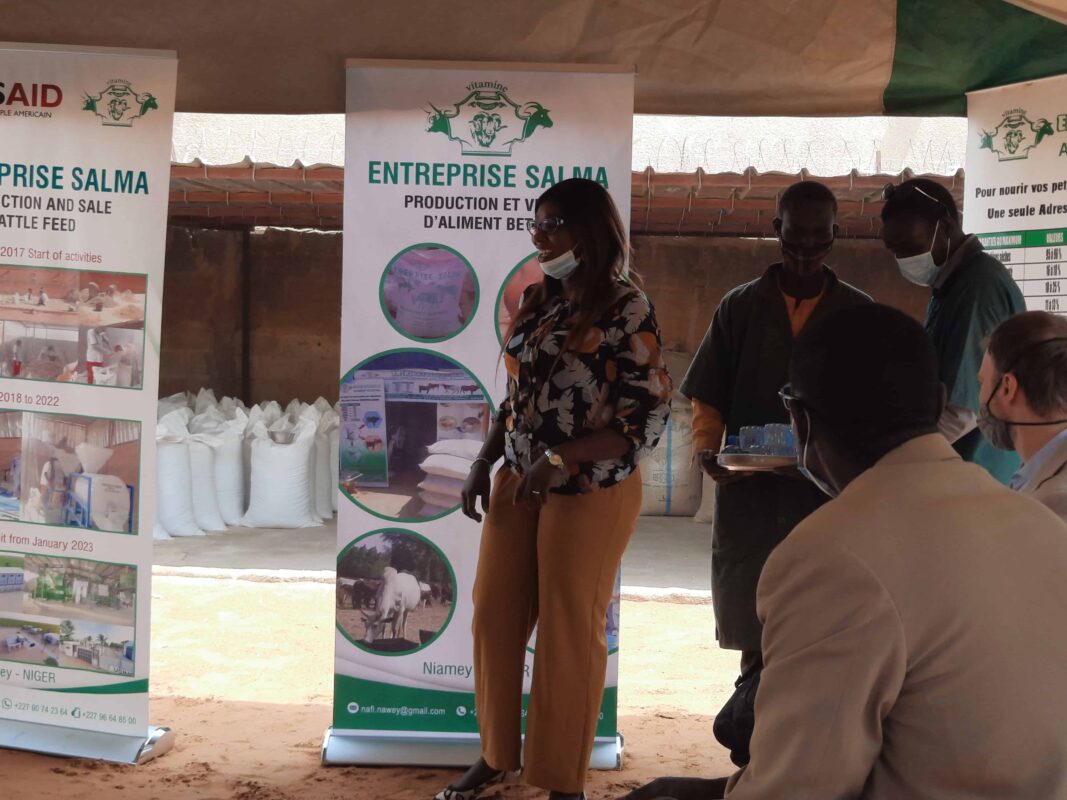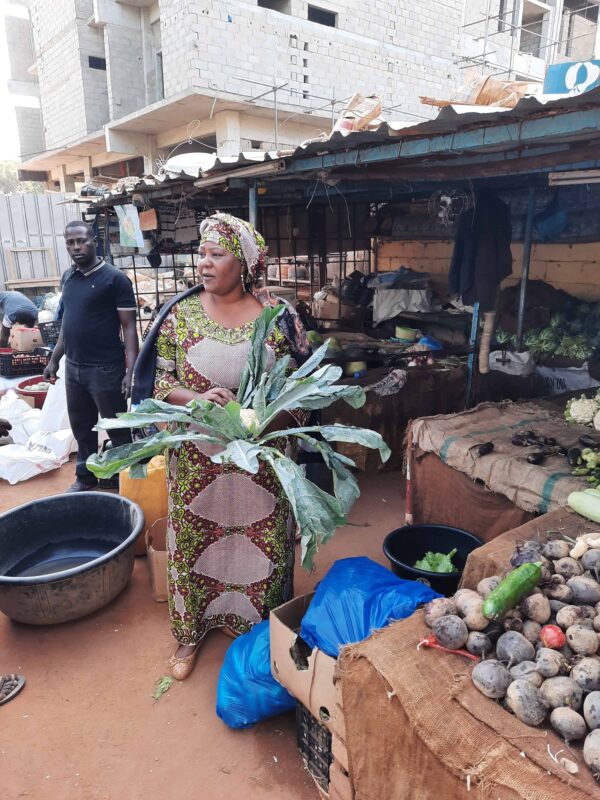Co-investments in three Nigerien agribusinesses support market expansion and job growth for women and youth farmers. Cuando Nafissa Hamidou Abdoulaye estableció Enterprise Salma en 2014, Ella soñó no solo de abrirse camino para las mujeres nigerien en agronegocios., pero de contribuir al desarrollo económico y social de su país creando empleos para mujeres y jóvenes.
Durante seis años, La compañía de Nafissa perseveró, emplear decenas de mujeres y agricultores a pequeña escala cuyos productos locales se convirtieron en materias primas en Feed de Enterprise Salma para rumiantes grandes y pequeños. La compañía con sede en Niamey vendió sus bolsas de alimentación de 25 kg en Níger y estaba mirando la expansión del mercado.

Pero luego el golpe de pandemia Covid-19, y la compañía de Nafissa, Como muchas empresas pequeñas y medianas en Níger, Tomó un éxito económico significativo. En 2020, Las ventas de Enterprise Salma disminuyeron de $409,000 a $10,000. La producción cayó drásticamente de aproximadamente 1,300 toneladas de alimento en 2019 a menos de una docena de toneladas en 2020. Las operaciones estaban casi en punto.
Nafissa necesitaba dinero de inversión para mantener su personal existente y reiniciar las operaciones de Enterprise Salma. Ella tenía opciones limitadas, sin embargo. Los bancos en Níger son reacios a financiar el sector agrícola del país, A pesar de su importancia en la economía nacional, Debido a desafíos impredecibles, incluido el clima, sequías y otros desafíos imprevistos. Las mujeres Nigerien que buscan financiamiento externo enfrentan desafíos adicionales debido a la discriminación de género.
Estados Unidos. Agencia para el Desarrollo Internacional Comercio de África Occidental & Centro de inversión (Centro comercial) Vio el potencial de que la empresa Salma floreciera donde otros bancos nigerien vieron riesgos. en noviembre 2021, el centro de comercio invirtió $439,355 en Enterprise Salma en una asociación de coinversión.
El dinero ayudará a Enterprise Salma a aumentar su producción anual de alimentos animales del actual 1,300 toneladas al año para 4,000 toneladas al año por 2024. Que dará como resultado un aumento en los ingresos de algunos 100 Pequeños productores de las materias primas del feed, incluido 50 Nuevos productores dirigidos por mujeres y jóvenes.
Con una inversión inicial de USAID, Nafissa ahora tenía la influencia de acercarse a los bancos comerciales en Níger para solicitar un financiamiento adicional que ayude a la empresa Salma a modernizar su producción de alimento y avanzar en la comercialización de la alimentación animal enriquecida y compuesta. Las mejoras permitirán a Nafissa y sus trabajadores compensar las pérdidas incurridas durante la pandemia Covid-19.
"Ciertamente, Esta producción aún no ha alcanzado el pico de 2019, Pero se está acercando. Esto era inimaginable en el medio de la 2020 crisis antes del apoyo del centro comercial,"Dice Nafissa.
El centro comercial de USAID administra una tubería de más que $1.2 mil millones en transacciones y se ha involucrado con más de 700 empresas privadas, así como asociaciones comerciales, Instituciones financieras de desarrollo y agencias gubernamentales.
En África occidental, el Trade Hub ha premiado 75 subvenciones $70 millones durante sus primeros dos años y medio. Se espera que estas coinversiones generen $560 millones en inversión privada, 59,000 empleos sostenibles y facilitar más que $456 millones en exportaciones en agricultura, artículos manufacturados, Energía y servicios al final del programa. La inversión privada generada es tan significativa que representa ocho veces el valor de los fondos de los centros comerciales.
"Con la inversión del centro comercial, Subvención de Hub de Comercio, Proporcionamos un nivel de comodidad a los enfoques de Níger Banks Enterprise Salma,"Tu ouattara, Un gerente de asociaciones público-privadas en el centro comercial. “Los bancos ven que USAID está involucrado y entiende que USAID es una organización creíble, Por lo tanto, se sienten más cómodos con involucrarse ".
Porque las empresas agrícolas nigerien enfrentan tales obstáculos para obtener financiamiento, el centro comercial al final 2021 identificó tres empresas en el país para ayudar a través de asociaciones de coinversión, incluyendo Enterprise Salama.
La granja de semenios ainoma, Una compañía de semillas de propiedad familiar comenzó en 2006 y ahora es uno de los productores de semillas más grandes de Níger, empleando principalmente mujeres. A través de su proyecto Operation School Garden Project, La compañía es líder en esfuerzos regionales para promover la agricultura como una elección viable de medios de vida, Particularmente para las mujeres rurales en Níger.

Como Enterprise Selma, Los agricultores de La Ferme Semenciere Ainoma se vieron severamente afectados por la recesión económica causada por la pandemia. El centro comercial coinió en la empresa con $461,527 para ayudar en la expansión de la producción de vegetales comerciales a gran escala con sistemas de riego para 400 Femeninas rurales. Se espera que la inversión inicial respaldada por USAID genere ingresos adicionales para la empresa a través de la venta de verduras durante el proyecto de dos años.
El centro comercial $463,158 La inversión ayudará Confederación cooperativa campesina hortícola de Níger, o ccphn, expandir su producción de papa, aumentar la capacidad de almacenamiento e invertir en soluciones de cadena de frío. La inversión inicial se realizó a fines de noviembre. 2021, y CCPHN ya ha comprado y distribuido semillas de papa y fertilizantes a 532 Productores de papa en tres regiones de Níger, así como proporcionó asistencia técnica a los productores de papa y reclutó 70 nuevos empleados.
Para cada una de las tres coinversiones en Níger, Las inversiones iniciales del centro comercial están apoyando a los agronegocios en un país donde se ha visto que asegurar el respaldo financiero como fuera de su alcance.
Incluso cuando un financiero está dispuesto a invertir, “Los términos y condiciones y garantías requeridas para el financiamiento son inaccesibles para las empresas jóvenes,"Dice Nafissa de Enterprise Salma.
“La coincidencia de una subvención del centro comercial al monto del préstamo solicitado fue, sin duda, el factor catalítico que permitió aprobar el préstamo bancario y comenzar el proyecto," ella dice.